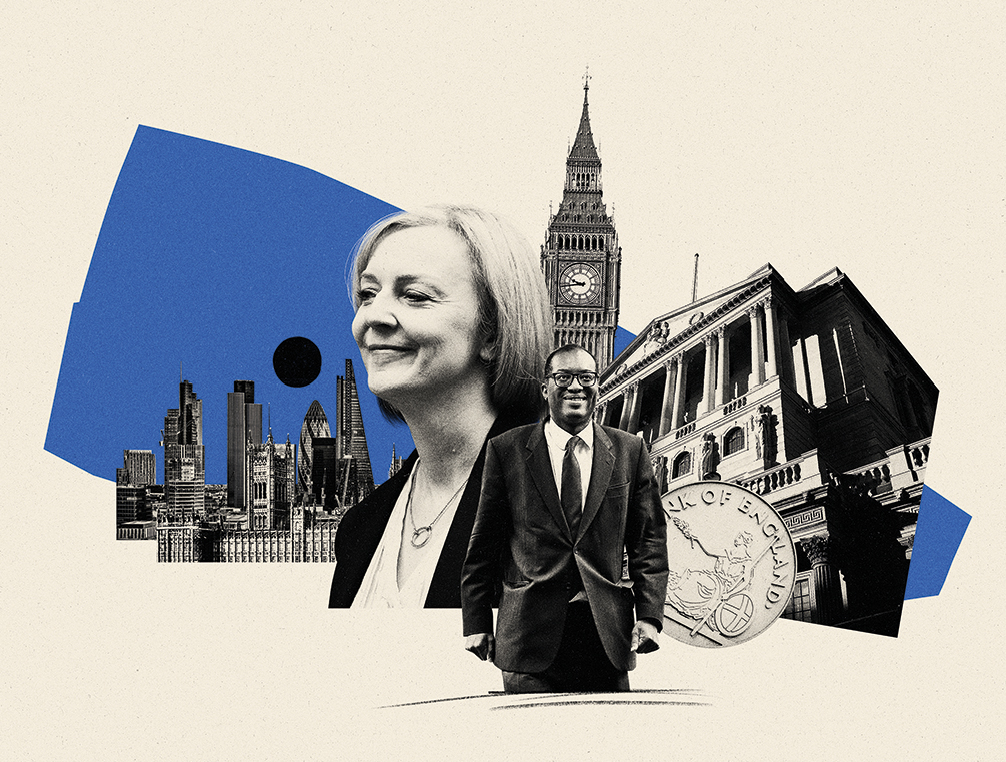
Liz Truss’s brief premiership was a political and economic catastrophe. The pound plummeted to a record low against the US dollar; the UK’s borrowing costs rose above those of Italy and Greece; and support for the Conservative Party fell to just 19 per cent. Faced with a revolt by the markets, voters and her own MPs, the prime minister was forced to abandon almost all of her agenda. On 25 October she left office after 49 days as prime minister.
Yet a year on, Ms Truss and her free-market allies remain defiant – and believe their time may yet come again. As Rachel Cunliffe writes in this week’s cover story on page 18, the Trussites view the prospect of opposition with relish. “Opposition has probably lent itself better to the kind of long-term strategic thinking that you need than government,” Kwasi Kwarteng, the former chancellor of the Exchequer, says. “It’s no accident that if you look at the last 50 years, the two great reforming governments were New Labour under Tony Blair, and Margaret Thatcher’s. It’s no surprise that a lot of their thinking was done in their long years of opposition.”
[See also: Liz Truss is more realistic than you might think]
In government, Rishi Sunak and his Chancellor, Jeremy Hunt, have eschewed the radical tax cuts favoured by Ms Truss and her closest allies, such as Mark Littlewood, of the Institute of Economic Affairs, for fear of losing market confidence. In opposition, however, the Trussites would have the opportunity to take back control of the Conservative Party.
In our cover story, the Trussites point out in their defence that two-year fixed mortgage rates are now almost as high as they were under Ms Truss (at more than 6 per cent) and that the British economy remains stagnant. The Conservative Party, meanwhile, continues to trail Labour by as many as 20 points in the polls.
The Trussites are resilient – indeed defiant – but have they learned from their defeat? They remain unwilling to confront some inconvenient economic truths.
The rise in mortgage rates reflects the persistence of inflation in Britain and the consequent increase in the Bank of England base rate to 5.25 per cent. Proceeding with Ms Truss’s £45bn worth of unfunded tax cuts would have only resulted in greater inflation and yet higher rates.
The Conservative Party may be unpopular, but there is little desire among a cautious electorate for a free-market revolution. The day before Mr Kwarteng’s mini-Budget on 23 September, the British Social Attitudes survey revealed that a mere 6 per cent of voters favoured a combination of tax cuts and spending cuts. The problem was not merely the uncompromising style that Ms Truss and Mr Kwarteng adopted in office – it was the substance of their reforms, which alarmed voters as well as the markets.
Where the Trussites have a stronger case is on economic growth. Even after recent upwards revisions to past GDP growth, Britain remains among the worst performers in Europe since 2019 (with growth of just 1.6 per cent). Some of the ideas championed by the Trussites, such as planning reform and faster infrastructure approval, could help the UK escape economic stagnation. But fundamental delusions persist. Britain’s biggest problem is not an excess of taxation – overall levels remain below the Western average – but a dearth of investment. The damage that Ms Truss’s free-market experiment inflicted on the UK’s international reputation made matters worse.
Ever since the 2008 financial crisis destroyed the illusion of perpetual growth, Britain has lacked a coherent economic model. Instead it has pursued a strange combination of neoliberalism and social democracy into which Brexit was thoughtlessly mixed.
Trussonomics was not merely a cause of Britain’s economic malaise – it was also a symptom of it. Mr Kwarteng’s mini-Budget was a desperate attempt to break the cycle of decline from the right. Corbynism was a comparable project from the left. Both the radical right and the radical left believe that the economic status quo is intolerable and demand counter-hegemonic transformation. But as Ms Truss’s fate shows, there is no shortcut to prosperity.
If Britain is to thrive it requires a far greater reckoning and an answer to the question that successive governments have ducked: what kind of country does it want to be?
[See also: Britain’s tax delusion]
This article appears in the 13 Sep 2023 issue of the New Statesman, The Revenge of the Trussites





